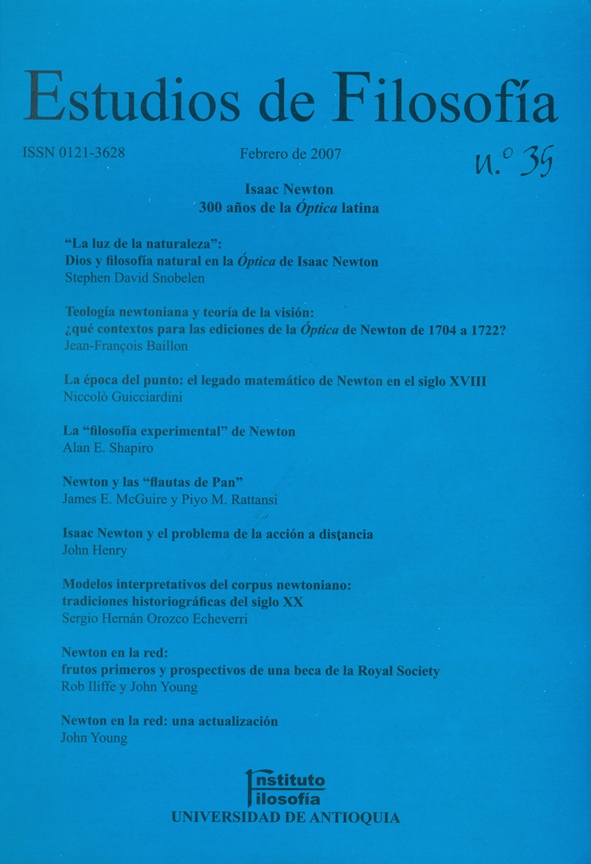Newton and the “Pipes of Pan”
DOI:
https://doi.org/10.17533/udea.ef.12758Keywords:
Newton, gravity, ancient wisdom, Hermeticism, classical ScholiaAbstract
This paper brake significant new ground arguing that Newton’s thinking is rooted in Hermeticism and the tradition of ancient wisdom. It uses, for the first time, important manuscripts that attest to Newton’s involvement in ancient wisdom. This is material that he seriously considered adding to the Third Book of the Principia i.e., the argument for universal gravitation.
Downloads
References
Bernier, F. Abrégé de la Philosophie de Garsendi. París, 1675.
Bigg, C. The Christian Platonists of Alexandria. Oxford, Clarendon, 1913. Blanchet, L. Campanella. París, Alcan, 1920.
Boyle, Robert. The Sceptical Chymist (1661). London, Everyman, 1949.
Cohen, I. Bernard. “‘Quantum in se est’: Newton’s Concept of Inertia in relation to Descartes and Lucretius”, en: Notes and Records of the Royal Society of London, 19, 1964. DOI: https://doi.org/10.1098/rsnr.1964.0013
Colligan, J. Hay. The Arian Movement in England. Manchester, Manchester Uni Pubs, 1913.
Conti, Natale. Mythologiae sive explicationis fabulanrm libri decem. Venecia, 1551.
Gassendi, Pierre. Philosophiæ Epicuri Syntagma, tercera edición. Lugduni, 1675.
Gregory, James Crauford. “Notice concerning an Autograph Manuscript by Sir Isaac Newton”, en: Transactions of the Royal Society of Edinburgh, 12, 1834, pp. 64-76. DOI: https://doi.org/10.1017/S0080456800030519
Guerlac, Henry. “Where the Statue Stood: Divergent Loyalties to Newton in the 18th Century’”, en: Aspects of the Eighteenth Century, 1965.
____________. Newton et Epicure. París, Palais de la Découverte, 1963.
Hall, A. R. y Hall, M. B. Unpublished Scientific Papers of Isaac Newton. Cambridge, Cambridge University Press, 1962.
Koyré, A. y Cohen, I. Bernard. “Newton and the Leibniz-Clarke Correspondence”,
Archives Internationals d’Histoire des Sciences, 15, 1962, pp. 63-126.
Kristeller, P. O. Eight Philosophers of the Italian Renaissance. Stanford, Stanford University Press, 1965.
James E. McGuire y Piyo M. Rattansi MacLaurin, Colin. An Account of Sir Isaac Newton’s Philosophical Discoveries.
Londres, 1750.
Macrobio. Macrobius’ Commentary on the Dream of Scipio, traducción de W. H. Stahl, New York, 1952.
Manuel, Frank E. Isaac Newton Historian. Cambridge, Cambridge University Press, 1963.
McLachlan, Herbert. Newton: Theological Manuscripts. Liverpool, Liverpool University Press, 1950.
Merk, C. Clemens Alexandrianus und seine Abhängingkeit der griechischen Philosophie. Leipzig, 1879.
More, Henry. A Collection of Several Philosophical Writings, cuarta edición. Londres, 1711.
____________. Remarks upon Two late Ingenious Discourses. Londres, 1676.
____________. The Inmortality of the Soul. Londres, 1659.
Newton, Isaac. Mathematical Principles of Natural Philosophy, ed. F. Cajori, Berkeley, University of California Press, 1934.
____________. Opticks or a treatise of re exions, refractions, in exions and colours of light, basada en la cuarta edición de Londres, 1730, New York, Dover, 1952.
____________. The Chronology of the Ancient Kingdoms Amended. London, 1728.
____________. The Correspondence of Isaac Newton, Vol. 3, ed. H. W. Turnbull, Cambridge, Cambridge University Press, 1961.
Pagel, Walter. Paracelsus. Basel-New York, Karger, 1958.
Quasten, J. Patrology. Utrecht-Antwerp, Spectrum, 1953.
Rattansi, P. M. “Paracelsus and the Puritan Revolution”, en: Ambix, 11, 1963, pp. 24-32. DOI: https://doi.org/10.1179/amb.1963.11.2.24
Read, John. Prelude to Chemistry. Londres, Bell & Sons, 1936.
Sailor, Danton. “Moses and Atomism”, en: Journal of the History of Ideas, 25, 1, 1964, pp. 3-16. DOI: https://doi.org/10.2307/2708082
Selden, John. De Jure Naturali juxta Hebros. Londres, 1640.
Sennert, Daniel. Hypomnemata physica. Francfort, 1636.
Seznec, Jean. The Survival of the Pagan Gods (traducción inglesa), New York, Pantheon Books, 1953.
Van Steenberghen, F. Aristotle in the West. Louvain, E. Nauwelaerts, 1955.
Vossius. De historicis Græcis, libro 3, Leyden, 1624. Walker, D. P. “The Prisca Theologia in France”, en: Journal Warburg & Courtland Inst., 1954, 17, pp. 204-259. DOI: https://doi.org/10.2307/750320
Westfall, Richard S. “The Foundations of Newton’s Philosophy of Nature”, en: British Journal for the History of Science I, 1962, pp. 171-182. DOI: https://doi.org/10.1017/S0007087400001345
Wood, Anthony. Athenæ Oxonienses, segunda edición. Londres, 1721.
Yates, F. A. Giordano Bruno and the Hermetic Tradition. London, Routledge & Kegan Paul, 1964.
Zeller, Eduard. A History of Greek Philosophy, traducción al inglés, Londres, 1889.
Downloads
Published
How to Cite
Issue
Section
Categories
License
Copyright (c) 2007 James E. McGuire, Piyo M. Rattansi

This work is licensed under a Creative Commons Attribution-NonCommercial-ShareAlike 4.0 International License.
Authors who publish with this journal agree to the following terms:
1. The Author retains copyright in the Work, where the term "Work" shall include all digital objects that may result in subsequent electronic publication or distribution.
2. Upon acceptance of the Work, the author shall grant to the Publisher the right of first publication of the Work.
3. The Author shall grant to the Publisher a nonexclusive perpetual right and license to publish, archive, and make accessible the Work in whole or in part in all forms of media now or hereafter known under a Creative Commons Attribution-NoCommercia-ShareAlike (CC BY-NC-SA 4.0), or its equivalent, which, for the avoidance of doubt, allows others to copy, distribute, and transmit the Work under the following conditions: (a) Attribution: Other users must attribute the Work in the manner specified by the author as indicated on the journal Web site;(b) Noncommercial: Other users (including Publisher) may not use this Work for commercial purposes;
4. The Author is able to enter into separate, additional contractual arrangements for the nonexclusive distribution of the journal's published version of the Work (e.g., post it to an institutional repository or publish it in a book), as long as there is provided in the document an acknowledgement of its initial publication in this journal;
5. Authors are permitted, and Estudios de Filosofía promotes, to post online the preprint manuscript of the Work in institutional repositories or on their Websites prior to and during the submission process, as it can lead to productive exchanges, as well as earlier and greater citation of published work (see The Effect of Open Access). Any such posting made before acceptance and publication of the Work is expected be updated upon publication to include a reference to the Estudios de Filosofía's assigned URL to the Article and its final published version in Estudios de Filosofía.















